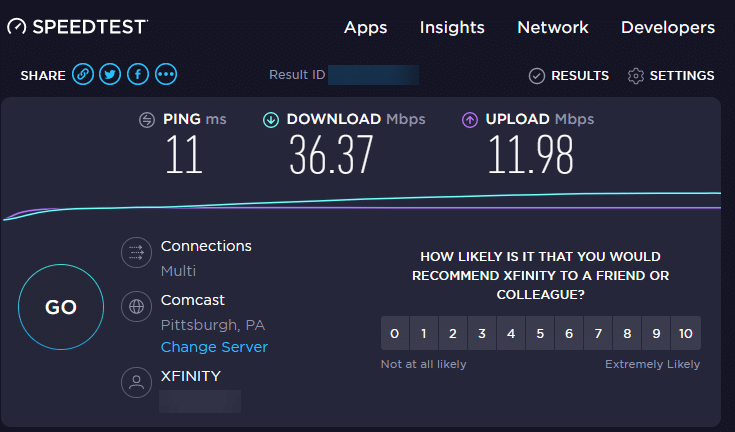Chances are that you’ve seen mention of 5G internet connections in the news, on TV commercials, or from your phone carrier. But what does 5G actually mean?
Let’s find out. We’ll look at what 5G is and how it will affect the internet, what it’s capable of, and what it means for business.
What Is 5G, Anyway?
Simply put, 5G is the fifth iteration of the standard that wireless cell networks use. The 5G stands for just that: fifth generation. You’re probably familiar with 4G (which most providers call 4G LTE) and 3G, which were previous generations of the standard.
The latest generation arrives roughly every ten years with new capabilities. 4G was faster than 3G, and 5G will be even faster. You’ve probably noticed that when you’re in an area with only 3G coverage that your phone is slow to load anything online. As the media we consume on phones has become more complex, so have network speeds.
What Does 5G Offer?
Since 5G hasn’t fully arrived yet, it helps to look at the theoretical speeds that these standards offer in order to compare them.
Our current 4G has a limit of 100Mbps, which is a solid speed but not exactly impressive in 2020. 5G, meanwhile, has a theoretical limit of 10Gbps, which is one hundred times faster than 4G. This means you could download a two-hour movie in a few seconds on 5G, which would take over five minutes on 4G.
Of course, most people probably won’t see 10 gigabit per second speeds with 5G. Something between 500Mbps and 1Gbps would be a more accurate estimate, but it’s hard to say for sure at this time.

But speed is not the only improvement the new standard makes. 5G promises lower latency, meaning that your requests travel from your computer to the remote device and back again more quickly. The 5G specifications promise a maximum latency of just 4 milliseconds, compared to the 20 milliseconds of 4G. Lower latency means more responsiveness for video calls, online gaming, and other real-time applications.
While faster speeds are always great, the introduction of 5G comes with another focus. 5G will enable modern technology like internet-connected cars and Internet of Things devices to have fast wireless internet everywhere. With millions of these devices already on the market and more coming out all the time, we need a new standard to handle their network throughput.
5G vs. Cable Internet
If you know a bit about internet speeds, you might have noticed that the numbers promised by 5G beat what cable providers can offer in many cases. 5G’s offerings are more akin to fiber internet speeds.
This means that companies like Comcast may face competition from 5G providers in the near future. Having blazing-fast internet everywhere you go without having to place physical wires is an attractive proposition.
However, an all-wireless future probably isn’t in the cards just yet. The data caps often imposed by internet service providers are the biggest hurdle. Many ISPs limit your internet usage to a certain amount of data each month, after which they cut it off or significantly reduce your speeds. With 5G allowing you to download faster than ever before, data caps will become a real roadblock.
When Will 5G Become Available?
As of early 2020, the four major US carriers have started rolling out 5G in some areas of the country. However, true 5G hasn’t really arrived. Similar to the early days of 4G, current 5G networks aren’t fully ready for prime time yet.
Even if your carrier offers 5G in your area, you’ll need a 5G-compatible phone to take advantage of it. While a few providers, such as Samsung, do make 5G-compatible phones, we don’t recommend buying them. They’re more expensive than standard models, and the technology in these devices isn’t perfected yet.
Because of the fast speeds, ISPs like Verizon also plan to provide home and business internet access through 5G. The company’s special 5G modem will receive the signal and then allow you to broadcast it (via Wi-Fi) to other devices in your home. This ensures you can get online, even with devices like laptops that don’t have cellular radios built-in.
Instead of a wire connecting the device to a physical line outside, your modem communicates with your ISP wirelessly. You’ll need to place the modem near a window, or mount an external modem outside if you can’t get a good signal inside.
This allows your modem to communicate with Verizon devices placed every few hundred yards on outside objects like light poles. Instead of a few cell towers that are placed far apart, 5G uses this large number of smaller devices to send the signal.
In addition, 5G uses extremely high-frequency “millimeter waves” for optimal speed. These waves don’t travel through solid objects well, so the multitude of smaller repeaters are used for the best speed. 5G still works without these functions, but they’re necessary for much of the speed benefit.
5G’s Effect on Business
As you’ve probably noticed, most of 5G’s benefits are untested at this point. However, we can still imagine how the revamped standard will affect everyday business for a lot of companies.
The widespread availability of fast internet connections mean that all companies will be able to integrate Internet of Things (IoT) devices into their workflows. Whether these are smart sensors, network-connected robots that perform mechanical tasks, or industry-specific applications, automation will likely grow even more quickly.
5G’s decreased latency will also affect all online communication. Office locations in remote areas that have to rely on cellular connections will have reliable service. Automated cars could revolutionize business travel in cities, And in theory, remote medical procedures could even become possible with 5G speeds.
The swift speeds of 5G will also enable business to collect and analyze data more efficiently than ever. Communication with remote servers will become almost instantaneous, making cloud services like Azure even more convenient and seamless.
5G and the Future
In summary, 5G will very likely change the way we think about internet connectivity.
The ultra-fast speeds will blur (or even erase) the line between home/business internet connections and mobile networks. Areas that have traditionally only had one available ISP will suddenly have new options for internet service, and the wireless connection will be much more convenient than laying fiber. Near-zero latency means devices can communicate in almost real-time.
It’s certainly exciting to think about what 5G will bring. For now, though, it’s still rolling out, so we’ll have to wait and see how it ends up materializing.
If you’re interested in learning more about the internet, find out what happens when you visit a website.

